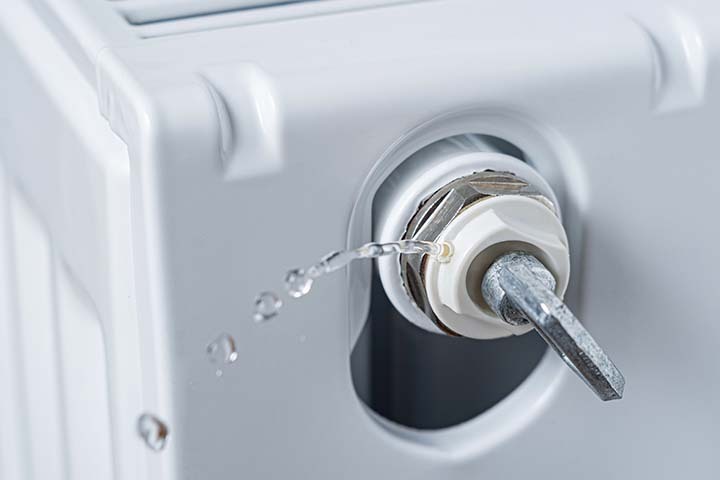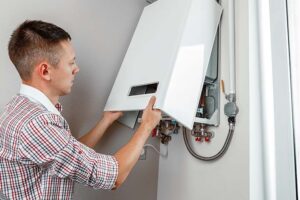Table of Contents
Major leaks in the central heating system can be detected and repaired easily. However, the slow leaks make it difficult for the homeowners to detect. These hidden slow leaks can cause water damage, lower energy efficiency, and increased heating costs.
This guide will help you in central heating leak detection and repair water leaks. So, bear with us for a few minutes as we dive deeper into the details.
What are the Signs of a Central Heating Leak?
One of the most common signs that indicate leaks in central heating systems is lower boiler pressure. However, there can be plenty of other reasons for lower boiler pressure, hidden leaks are one of them.
Here are the most common signs that say: there’s a leak somewhere:
1. Boiler Pressure Drops
If your boiler is constantly losing pressure, you need to find a water leak in your system. Sometimes, it might be obvious that water dripping from your boiler right underneath it. While the other times, it can a leakage in the water supply or pipework.
2. Damp Patches Indicating Leak Detection
If you are seeing decoloured walls, ceilings, floors, and wet patches near radiators, radiator valves, and pipes, that’s a major sign that your use to be efficient heating system is experiencing leaks in the central heating system.
3. Weird Noise in the Radiators
IF you are hearing gurgling, hissing, or dripping sounds from your radiators (or faulty radiator valves might be the culprit), this might be a sign of a leaking boiler. These sounds can also be caused by topping water pressure in the pressure gauge.
4. Corrosion or Rust Buildup
You need to keep a regular check on the pipes, radiator, valves, and discoloured patches to ensure you can spot the leak in om central heating system. If you see rust or corrosion, you need to locate the leak and repair it.
Air Source Heat Pump Grants
How to Do Leak Detection in a Central Heating System?
There are several leak detection methods you can use to find a leak. Here are some of the most effective methods we use for detecting leakage.
1. Visual Inspection to find a Leak
You should inspect the radiators, boiler, valves, and pipes to find visible signs of leakage. You might see wet patches, water dripping, discoloured walls, ceiling, and floor.
2. Using Thermal Imaging Cameras
These advanced devices can detect the unusual heating flow in the pipes and radiators. This helps detect the hidden leaks under the walls or in hidden places. Thermal imaging will help you stop the leakage before your property gets damaged.
3. Tracer Gas Detection
This system starts topping up the system with non-toxic gas in the heating pipes to find the location of the leak. This system has specialised equipment to pinpoint where the gas escapes.
This technology especially helps where leaks are difficult to detect, but can cause damage to your home.
How to Fix Central Heating Leaks?
Before you find out the ways to fix water leaks in the system, you need to understand that you need professional help for major issues like pipe replacement, the area is not accessible, or valve repairs. Also, the advanced leak detection should be carried out by professionals.
Here are Some DIY Solutions for Minor Leaks:
- Apply Sealants: You can apply pipe sealants or joint compounds to stop the minor leaks in the pipework. However, make sure to clean the area before application for optimum results.
- Tighten the Connections: While this should go without saying, you should use tools or joint solutions to tighten the connections in the pipework or radiator valves. Sometimes, that’s the obvious sign of a central heating mould growth.
- Wrap the PTFE Tape Around: The plumber’s tape can do the job for leaking radiators and spindles, as it can seal the gaps quite effectively. If the leakage is in the radiator glands, you need to open the gland nuts, apply the tape, and reassemble.
Seek Professional Help For Major Issues
If you find issues like pinhole leaks in the radiators, pipe replacement, valve repairs, or other problems, you should consult an experienced and Gas Safe registered heating expert to fix the central heating leak.
Final Thoughts
If you are seeing signs like low boiler pressure throughout the day, the boiler making noises, or damp patches around the system/home, you need to find out where your central heating system is leaking. If you can’t find it through visual inspection, you need to get expert help.
If the leak is minor and can be fixed through DIY, do it yourself. Otherwise, calling a professional is the safest option.
Frequently Asked Questions
You need to look out for visual signs of leakage like dripping sounds, water under sinks, the boiler, or near radiators, or damp patches. That’s how you should be able to find a leak. If not, professional services are the way forward.
You can add leak sealer solutions to the system through the header tank. However, this can be a temporary solution as pinhole leaks in radiators often need replacement.
For a typical central heating system, 1 litre of leak sealer should be enough. However, for the large heating systems, you might need twice the amount of leak sealer.



